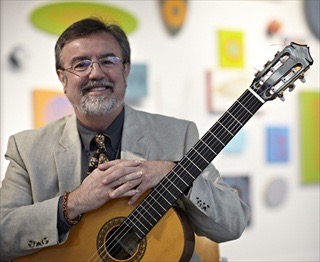In junior high, Enric Madriguera travelled with his father from Connecticut to New York to attend a guitar concert by the famous Andre Segovia. That experience convinced Madriguera to become a lifelong guitarist, resulting in him travelling the world with his music as a professor at UTD.
He first graduated from the Royal Conservatory in Madrid, and then came to UTD, kindling the same passion among students that he developed as a young boy.
After obtaining his doctorate, Madriguera became an endowed professor and set about the task of expanding the music program at UTD, with a special focus on guitar studies.
“I really think that no university or institution is complete without a solid music department,” he said. “I wanted to develop that at UTD.
As the Russell Cleveland Professor in Guitar Studies, Madriguera teaches and organizes local competitions frequently. He also travels to countries like Spain, Mexico, Brazil and Vietnam to learn more about international classical guitar study and spread word of the UTD guitar studies program. For the first time this year, Madriguera received invitations from China and Japan to play and teach at guitar societies and universities.
“I’d never been invited to Japan at that point, so it was exciting because I really wanted to go,” he said. “China was the same way. This was my first invitation, so it seems like my work is spreading.”
Although Madriguera is a full-time faculty member, he still finds the time to create and release albums of guitar music on iTunes and Amazon Music. His presence as a contemporary artist is one reason he secured invitations to perform and teach.
“Well, I just released a new CD, and it got pretty good reviews, so that certainly helped things,” he said. “And wherever I go, I go as a faculty member of UTD. And UTD is a fine institution, so I’m sure that’s part of it too.”
The trip to China was separated into two parts, both geographically and conceptually. Madriguera visited two cities — Nanjing and Wuhan. At both locations, he lectured at local universities or guitar societies and played classical guitar concerts.
He was pleasantly surprised at the level of Western classical guitar instruction in the heart of China, he said.
“When I first started doing this thing, I was worried that they might not take my music too well, especially when I went to Vietnam,” Madriguera said. “But I was really surprised at the level of classic guitar instruction in Asia. Japan, especially, is very developed, and China too is on the trend of high development in the area.”
Madriguera would start with a technical lecture and a presentation of what UTD’s guitar studies program has to offer, and then would play a concert for the audience.
He sees the trip to China as well as the more informal trip he made to Japan as steps towards growing the UTD guitar program while building relationships abroad.
“Actually, in Japan, I was working with colleagues that I had worked with previously in Spain,” he said. “So this kind of thing happens a lot in the music world. We tend to be pretty connected. Even in Wuhan, I played with a traveling music group, and they invited me to play with them again in Hong Kong.”
To Madriguera, the trips are making a real impact on students in Asia as well as the guitar program here at UTD.
“We’ve actually gotten some interest from Chinese students … after my presentations in Nanjing and Wuhan,” he said. “We’re hoping to have some of them come and play at our annual festival in March.”







